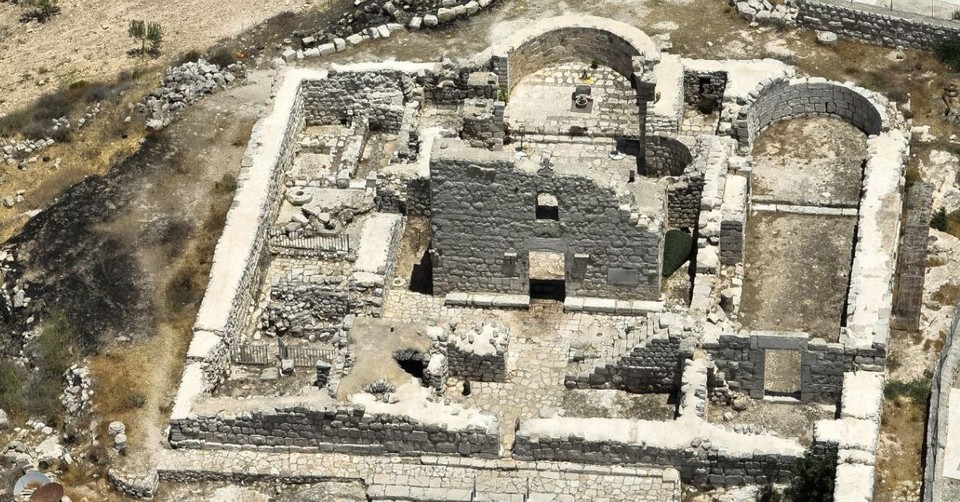The Truth about What Happened in Taybeh and Why Christians Must Be Careful with Headlines

Tragedy or Tale? What began as a brush fire in the Palestinian Christian village has sparked international outrage, accusations of settler violence from the likes of the Associated Press and Al Jazeera, and an urgent call for an investigation.
Last week, media outlets and social platforms exploded with reports that Israeli "settlers" had set fire to an ancient church in Taybeh, a historic Christian town in the biblical heartland of Judea and Samaria, also known to much of the world as the West Bank.
Former Arkansas Governor and U.S. Ambassador Mike Huckabee, who visited the site, jumped into the online fray, voicing his concern in a post on X: “Desecrating a church, mosque, or synagogue is a crime against humanity and God.”
Taybeh is a quiet Palestinian Christian village south of Jerusalem w/ a lot of American citizens that has been vandalized-including fires set at ancient church. I visited there today. Desecrating a church,mosque or synagogue is a crime against humanity & God. pic.twitter.com/fGI6tCLQuC
— Ambassador Mike Huckabee (@GovMikeHuckabee) July 19, 2025
But shortly after the allegations surfaced, questions about their credibility quickly began to emerge.
Eliana Passentin, Director of the Foreign Desk at the Binyamin Regional Council and an archaeologist by training, visited the site and posted a video offering her professional opinion in the form of an informal investigation.
“I don’t see any signs of a fire. I don’t see a church burned down,” she said. “This is an ancient archaeological site… Even if I tried, there’s no way to burn it down.”
Passentin noted that while there had been a small brush fire near the church grounds, the structure itself—constructed from ancient stone—was untouched. She called on Christian communities around the world not to be misled by false narratives, emphasizing, “We are the guardians of the biblical heartland… There is no reason for us to burn a church or to disrespect anyone else’s religion.”
Israeli Police echoed her findings. In an official statement, the Police Spokesperson’s Unit declared that the reports of a church burning were “factually incorrect” and “lack any evidentiary basis.” They confirmed that while there was a localized fire in an adjacent area, the church and surrounding infrastructure remained unharmed.
Ambassador Huckabee also updated his earlier statement, clarifying: “I have NOT attributed the cause of fire to any person or group. The press has.” He also reposted the statement from the Police concluding that there's really no truth to this story of settlers targeting Christians.
“I want to extend my deep thanks to Ambassador Mike Huckabee for his important clarification. He is a true friend, and I value his integrity and willingness to stand with us, not only in support, but in seeking the truth. His voice carries weight among Christian communities around the world, and his commitment to uncovering the facts is a powerful blow to those who seek to defame Israel and its citizens.” - Yisrael Ganz Governor Binyamin Regional Council and Chairman of the Yesha Council
However, The timing of this controversy coincides with a historic diplomatic initiative led by Yossi Dagan, head of the Samaria (Shomron) Regional Council. Dagan, often referred to as the “Governor of Samaria,” recently secured agreements with lawmakers in eight U.S. states—including Utah, Louisiana, and Tennessee—to promote legislation that would officially replace the term “West Bank” with “Judea and Samaria.”
“This is nothing short of a revolution,” Dagan said. “The mission is clear: to bring sovereignty to Judea and Samaria — the Land of the Bible.”
As the investigation into the fire continues, many are questioning whether this incident was simply a misunderstanding—or a calculated attempt to smear Jewish communities living in their ancestral homeland. That word, "ancestral," is a key piece to this story and possibly the root cause of the overall tension about Judea and Samaria. Western media continues to push the narrative that Jews in the West Bank are stealing land from Palestinians. However, archeologists have found proof of Jewish existence in the land long before terms like "the West Bank" existed.
The “House of David” inscription found in 1993 at the site of Tel Dan in northern Israel by Israeli archeologist Avraham Biran is one such piece of evidence. The inscription commemorates the victory of an Aramean king over the "king of the House of David." The fragment, which can be seen at the Israel Museum in Jerusalem, dates to the 9th century B.C., which is over 3000 years ago. The artifact verifies the existence of the House of David and proves that the Jewish people in fact are the indigenous people of Israel. So the term "settling" should be replaced by "returning" to their ancestral homeland.
Returning to Taybeh, some have likened the media's portrayal of this incident and the clear agenda to paint Jewish settlers as violent against Christians to a modern-day “blood libel.” The tale echoes historically false accusations used to incite antisemitism. A violent mob killed over 40 in The Kielce Pogrom of 1946 as Jews returning to their homes were accused of abducting and murdering Christian children. It sounds extreme to compare the fire in Taybeh to mobs killing Jews, but as George Santayana said, “Those who cannot remember the past are condemned to repeat it.”
This event is a poignant reminder of what my Mother always used to say to me, "Watch your mouth!" Proverbs 18:21 reads: “Death and life are in the power of the tongue, and those who love it will eat its fruits.” We all must take care to choose the correct words with the proper Biblical meaning. A "Jewish Settler" is not someone taking land that doesn't belong to them, but rather a person reinhabiting a land that is already theirs.
In a world quick to condemn but slow to verify, Christians are left with an important question: Are we being misled by headlines, or standing for truth?
Photo Credit: Binyamin Regional Council

Alongside his wife, R.J. Swanson, he has been actively involved in anti-human trafficking initiatives since 2009. He also works to foster connections between Christian and Jewish business and faith leaders, consulting for organizations in both Israel and the U.S. An avid traveler and food enthusiast, Joshua shares culinary adventures on the Paired! blog.

Originally published July 22, 2025.







